Mindfulness and meditation statistics can reveal more than we ever imagined about mental health. We anonymously surveyed 57,410 community members at Sons of Universe—61% of whom are based in the US—ranging from the just curious to personal growth addicts interested in the subject.
The insights were astonishing: 68% had mind-blowing experiences during meditation. Our passion for data led us to conduct this profound survey, and we’re thrilled to be the first to explore how zodiac signs influence our mindfulness journeys.
Join us as we unveil 21 surprising statistics (with extra juicy ones just added) that could change how you see mental health.
Key Takeaways
- Mindfulness Is (Mostly) Female: A surprising 79% of our mindfulness community are women. Where are all the men in meditation?
- Heartbreak to Healing: 18% started meditating after a divorce. Can mindfulness mend a broken heart?
- Money Can’t Buy Calm, Or Can It?: 40% earning over $70k practice regularly. Does a higher income make it easier to find inner peace?
- Meditation isn’t just for stress relief—25% use it to calm daily anxiety, but a surprising 18% meditate to attract financial abundance
- The “I’ll Start Tomorrow” Crowd: A whopping 43% are infrequent practitioners. What’s holding us back from daily meditation?
- Mind-Blowing Moments: 68% have had profound experiences while meditating. What’s happening during these sessions?
- Rewiring Our Brains: 82% believe meditation can rewire the brain—and science backs us up!
- Nap Time or Mind Time?: Nearly half admit to falling asleep while meditating. Is dozing off a problem or part of the process?
- Escape Artists: Over 50% use meditation as a quick stress fix. Are we missing the bigger picture of mindfulness?
- App Fatigue Is Real: Only 28% find meditation apps helpful. Are apps more hype than help?
- Life-Changing Insights: 35% experienced major ‘aha’ moments during meditation. Could you be next?
- Cosmic Connection: Pisces, Virgo, and Libra are the top meditators in our community. Is your zodiac sign among the most mindful?
Sources: Sons Of Universe, Clinical Psychology Review, National Center for Health Statistics, Harvard Gazette, Social Cognitive and Affective Neuroscience, Journal of Consulting and Clinical Psychology, Journal of Behavioral Medicine, Psychological Science, National Center for Complementary and Integrative Health, Harvard Health Publishing.
1. Mindfulness Is (Mostly) Female: 79% of Our Practitioners Are Women—Where Are the Men?
When we crunched the numbers from our survey, one thing was crystal clear: women are dominating the mindfulness scene. A whopping 79% of our practitioners are female. So, where are the men? It seems like guys might be missing out on the benefits of meditation.
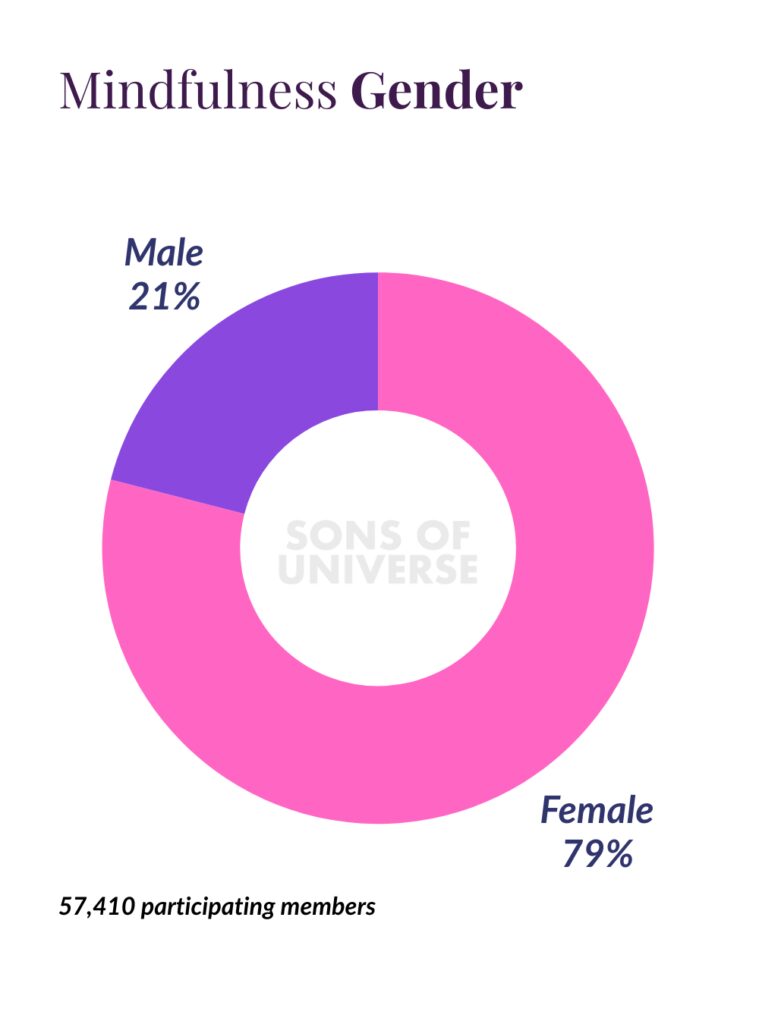
Maybe it’s because mindfulness is sometimes seen as a touchy-feely practice, and societal expectations keep men from diving in. But with stress levels skyrocketing and mental health being more important than ever, it’s time for everyone to take a seat on the cushion. Mindfulness isn’t just for one gender—it’s a tool for anyone looking to find balance and peace in their lives. Let’s bridge that gap and invite more men to join the mindfulness movement.
2. Middle-Aged and Mindful: 60% of Meditators Are Between 35-54 Years Old
Guess who’s most likely to be sitting quietly with their eyes closed? Folks between the ages of 35 and 54. Our survey shows that 60% of meditators fall into this age bracket. Why might that be? Well, middle age often brings a heap of responsibilities—careers, families, mortgages—you name it.
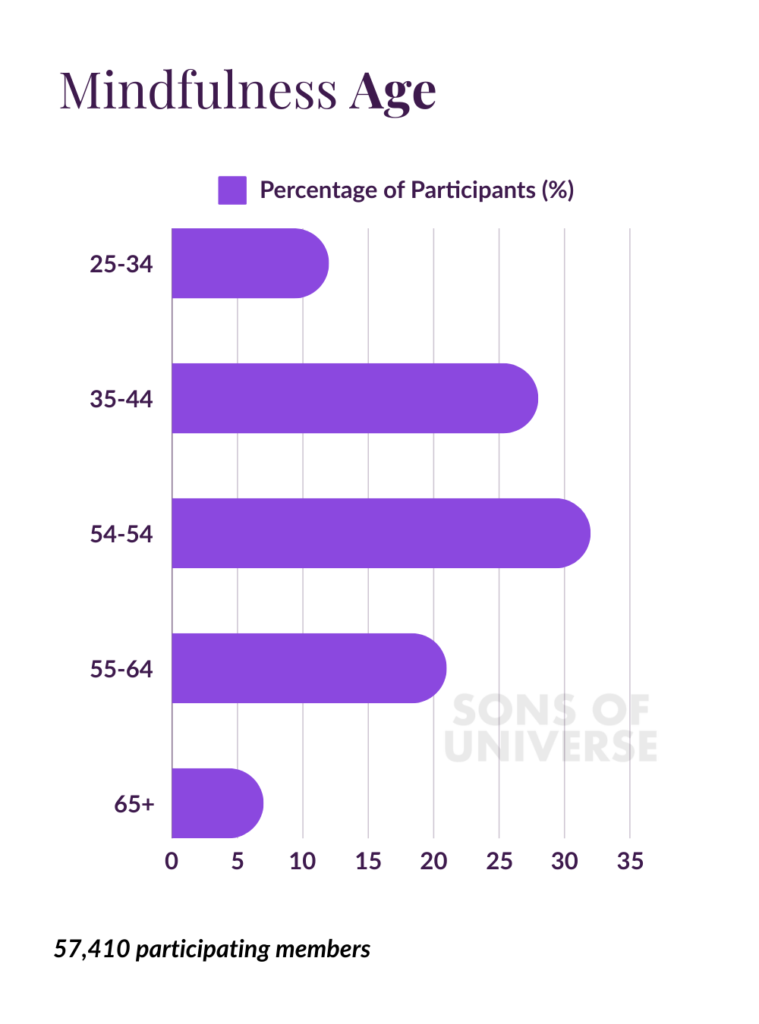
With all that pressure, it’s no wonder this group is seeking out ways to de-stress and find some inner calm. Plus, as we navigate life’s ups and downs, mindfulness offers a way to stay grounded. Younger people might feel invincible, and older adults might have already found their rhythm. But for those in the middle, meditation seems to be the go-to tool for navigating the chaos.
3. America’s Mindful Majority: Why 61% of Our Community Hails from the U.S.
Did you know that 61% of our mindfulness community comes from the United States? That’s a big chunk! So what’s making mindfulness so popular in the U.S.? For starters, the hustle and bustle of American life can be overwhelming. With work deadlines, social commitments, and the constant buzz of technology, people are searching for ways to unplug.
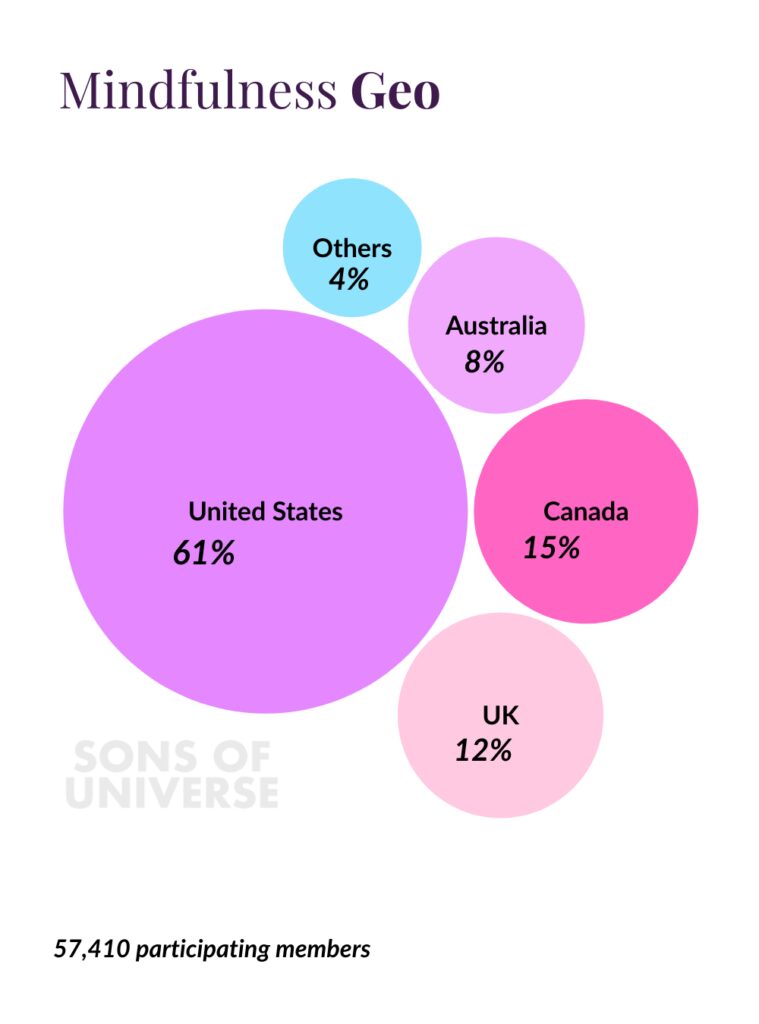
Mindfulness offers that escape. Additionally, the rise of mindfulness-based stress reduction programs and apps has made meditation more accessible than ever. Cultural trends embracing wellness and self-care are also fueling this interest. But mindfulness isn’t exclusive to the U.S.—it’s a global practice that anyone, anywhere can tap into. Whether you’re in Canada, the UK, Australia, or beyond, the path to mindfulness is open to you.
4. Married and Meditating: Do Committed Relationships Boost Mindfulness?
In our survey, we found that 61% of our community are in committed relationships—37% married and 24% in stable partnerships. So, does sharing life with someone make you more mindful? It might. Couples often face shared stresses and joys, and many turn to mindfulness practices to navigate them.
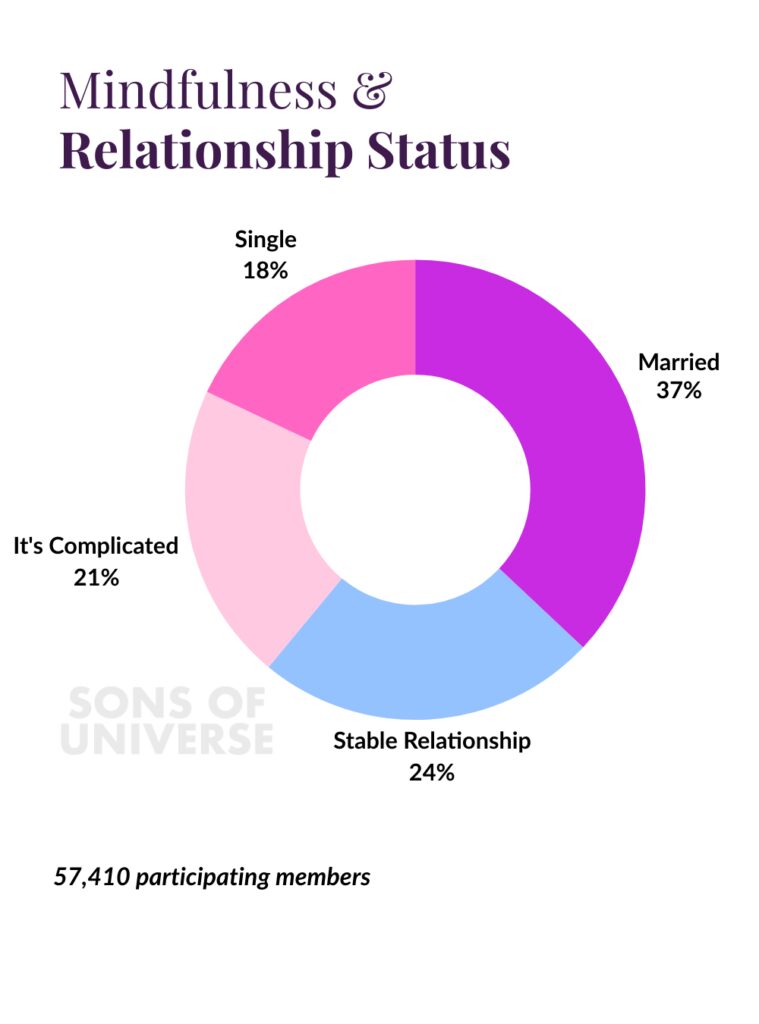
Maybe they’re using mindfulness-based stress reduction to handle daily pressures or improve their emotional connections. Being with someone can highlight the importance of emotion regulation, and meditation offers tools for that. On the flip side, singles might use mindfulness to focus on personal growth. Either way, relationships seem to play a role in how and why we meditate. It’s fascinating to see love and mindfulness go hand in hand.
5. Top 7 Reasons People Meditate (And How They Stack Up)
Why do people meditate? Our survey revealed some fascinating and personal motivations behind mindfulness practices. Topping the list, 25% of participants meditate to reduce daily stress and anxiety—no surprise given how hectic life can be. Interestingly, 18% meditate to attract financial abundance and success, using mindfulness to align with their goals. Emotional healing is another major factor, with 16% turning to meditation to heal from past relationships and heartbreak.
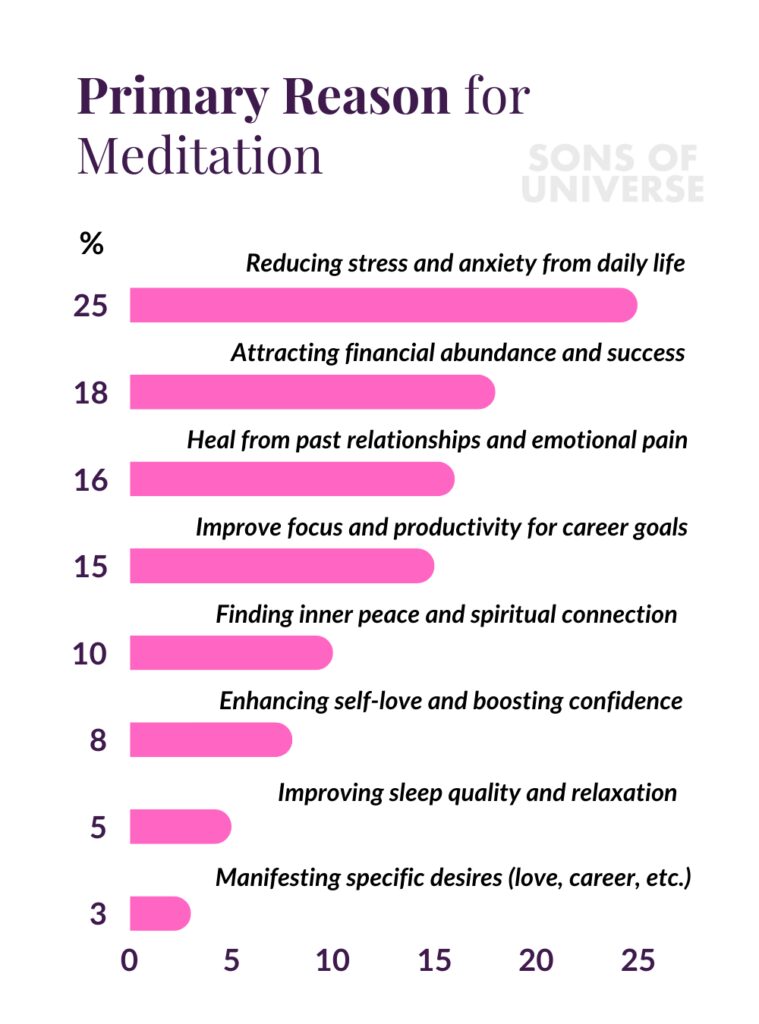
Additionally, 15% use meditation to improve focus and productivity, particularly to excel in their career or academic goals. On a more spiritual note, 10% meditate to find inner peace and a deeper connection with themselves. Enhancing self-love and building confidence drives 8% of practitioners, while 5% meditate for better sleep and relaxation. Finally, 3% focus on manifesting specific desires, like attracting love or achieving career milestones.
These diverse reasons show that meditation is far more than just a stress-reducer—it’s a powerful tool for personal growth, healing, and achieving success.
6. Divorce and Inner Peace: 18% Turned to Meditation After Splitting Up
Breakups are tough, and divorce can be life-altering. Our survey revealed that 19% of participants started meditating after a divorce (out of the 22% who divorced). That’s nearly 86% of divorced individuals finding solace in mindfulness after a split. It seems that major life changes push us to seek new ways to heal.
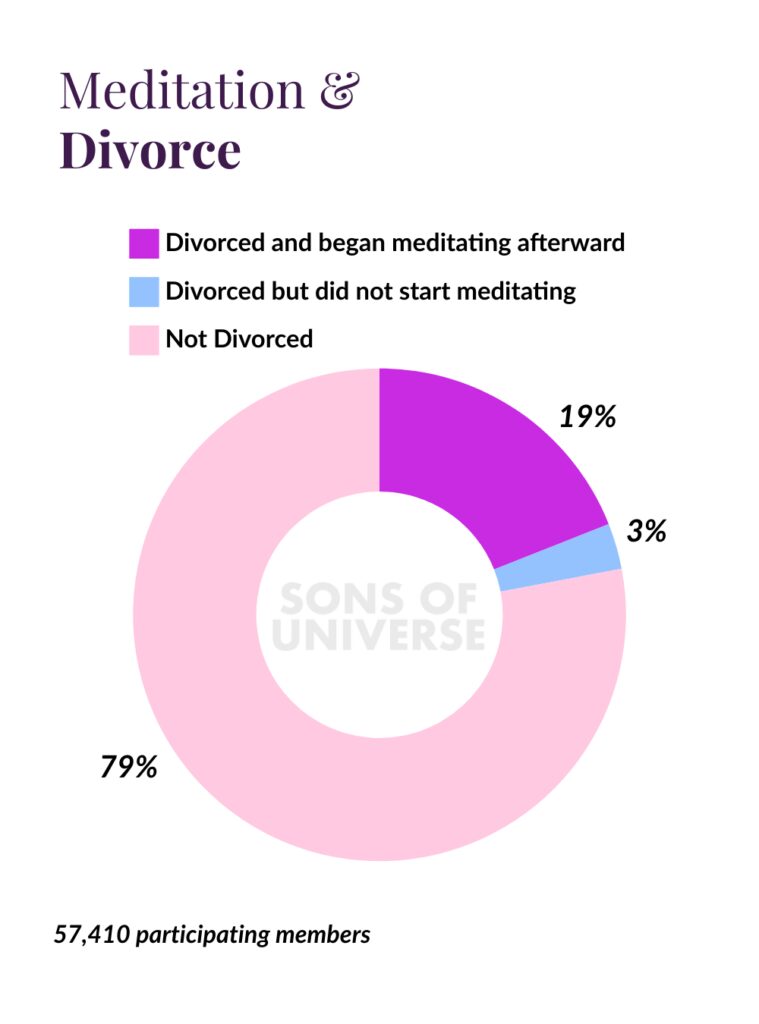
Meditation might help manage symptoms of depression or reduce psychological distress during such times. By practicing mindfulness meditation, people may find a path to inner peace and better mental health. Divorce can trigger chronic stress, but mindfulness offers tools for emotion regulation and coping. It’s inspiring to see how some turn a painful experience into an opportunity for growth. Meditation becomes a way to rebuild and move forward with resilience.
7. High-Stress Jobs, Higher Mindfulness: 35% in Healthcare and Tech Turn to Meditation
Stressful jobs seem to lead people to mindfulness. Our survey showed that 35% of meditators work in healthcare and tech—20% are healthcare professionals, and 15% are in tech. These fields are known for high pressure and long hours. Maybe that’s why so many turn to meditation practices to find balance.
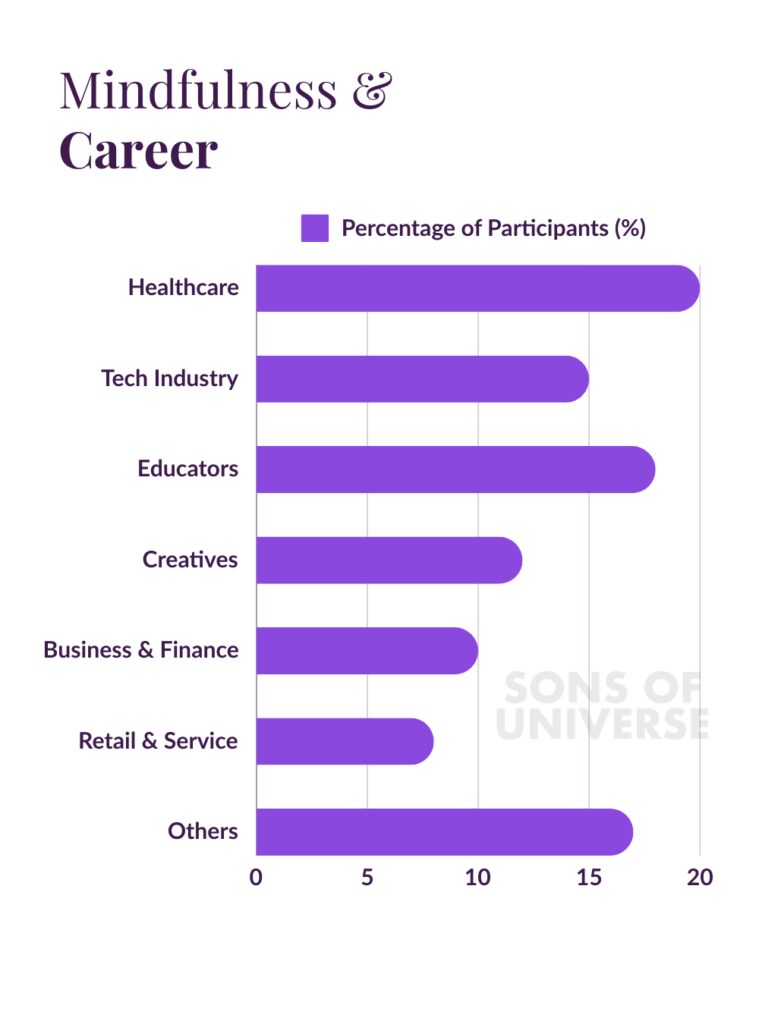
Mindfulness can help with stress reduction and improve mental health. It might also enhance cognitive processes and attention span, which are crucial in these jobs. Educators, creative professionals, and others also find value in mindfulness. But it’s clear that those in demanding careers are seeking tools to cope. Meditation offers a way to manage work-related stress and maintain emotional well-being.
8. Does Money Buy Calm? 40% Earning Above $70k Practice Regularly
Is there a link between income and meditation? Our survey suggests there might be. Among those earning over $70,000 a year, nearly 40% practice meditation regularly. For those making over $100,000, the number jumps to 50%. Maybe higher earners have more access to resources like mindfulness-based stress reduction programs or meditation apps.
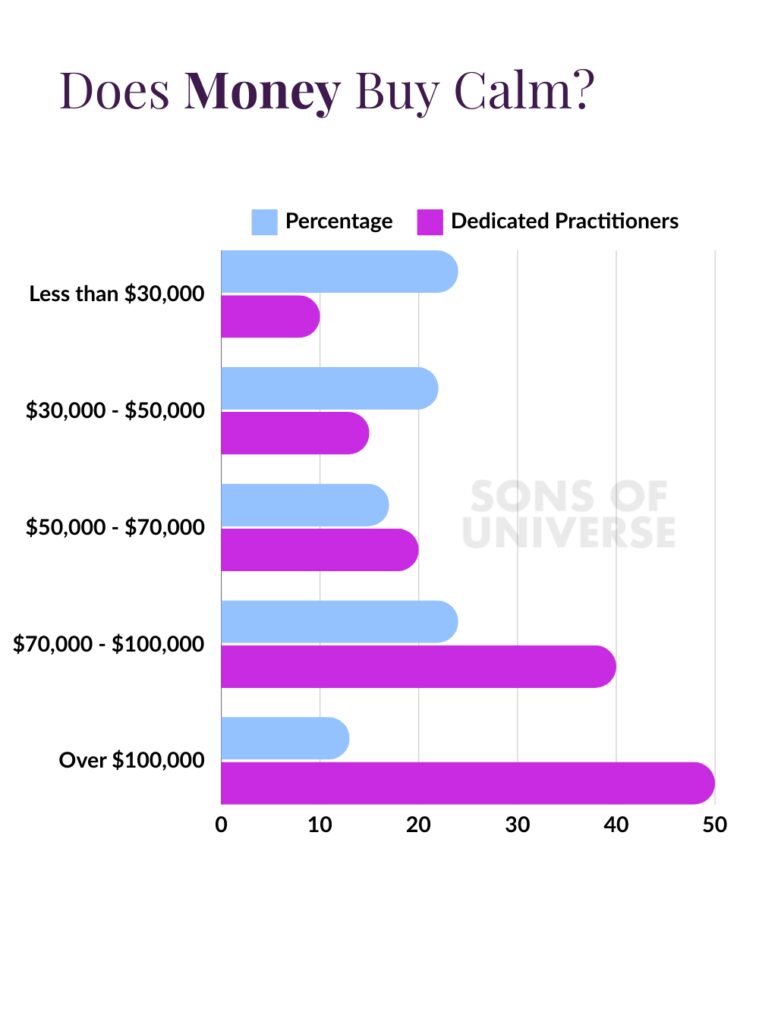
Or perhaps the pressures of high-paying jobs drive them to seek relief through mindfulness practices. On the other hand, those earning less might face barriers like time constraints or lack of access. It’s interesting to see how income levels impact mindfulness engagement. But regardless of earnings, meditation offers benefits for everyone. Finding time to practice can enhance mental health and reduce chronic stress, no matter what’s in your wallet.
9. The “I’ll Start Tomorrow” Crowd: 43% Are Infrequent Practitioners
Ever told yourself you’d start meditating tomorrow, only to push it off again? You’re not alone. Our survey shows that 43% of people are curious beginners—they’ve tried mindfulness a few times but haven’t made it a habit. So what’s stopping us from practicing meditation regularly?
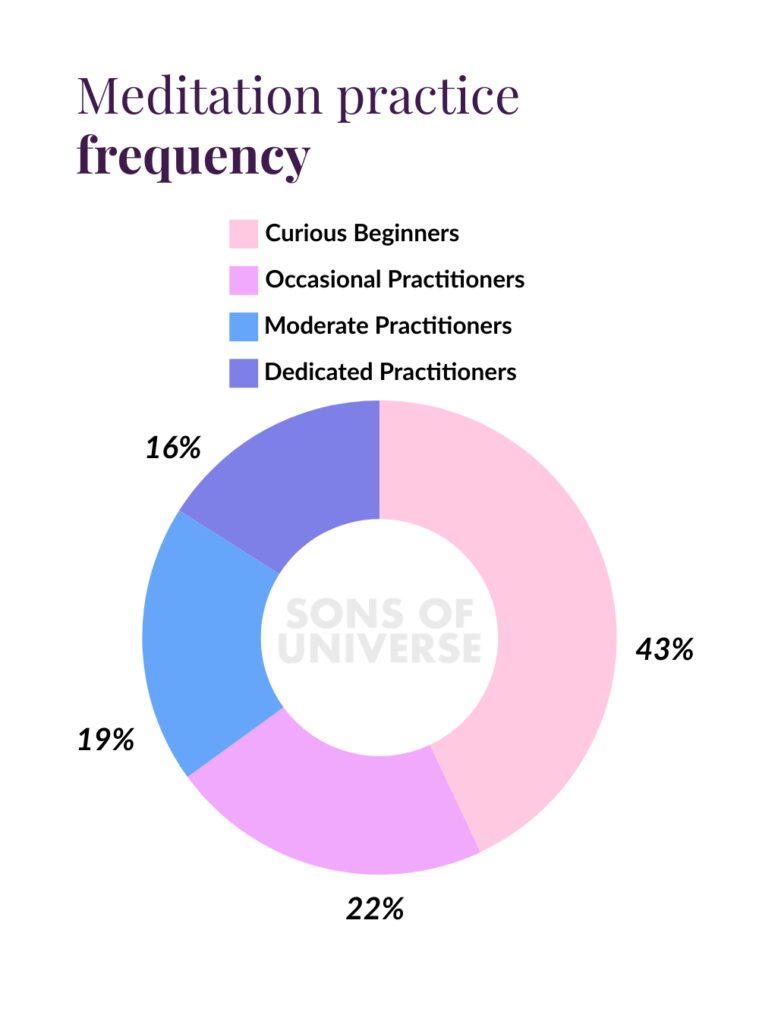
One big hurdle is not knowing how to fit it into our busy lives. With work, family, and endless to-do lists, finding even ten minutes can feel tough. Others struggle with quieting their minds, feeling frustrated when thoughts keep popping up. But here’s the thing: meditation doesn’t require perfection. It’s called a practice for a reason.
Interestingly, the benefits of meditation are too good to ignore. From reducing psychological distress to improving mental health, mindfulness meditation can make a real difference. So maybe it’s time to stop saying “tomorrow” and start today. Even a few minutes can set you on the path to a calmer mind.
10. Meet the 16%: The Dedicated Daily Meditators Defying the Odds
Guess what? Only 16% of our community are dedicated practitioners who meditate almost every day with a structured approach. These folks have fully integrated mindfulness into their lives. How did they do it?
Many started small, maybe just five minutes a day, and built up from there. They might use mindfulness-based stress reduction programs or popular meditation apps to stay on track. The positive effects they’ve experienced—like better emotion regulation and reduced chronic stress—keep them motivated.
Studies show that regular meditation can even change brain structure, improving areas responsible for attention span and cognitive processes (source: Clinical Psychology Review). These dedicated meditators prove that with consistency, the benefits of mindfulness meditation are within reach. So why not give it a try? You might be surprised at how much it can improve your daily life.
11. Stress-Triggered Serenity: 22% Only Meditate When Life Gets Tough
When stress hits, some of us turn to meditation as a quick fix. Our survey found that 22% of people meditate primarily in response to tough times. While mindfulness can certainly help reduce symptoms of depression and anxiety in the moment, relying on it only when things get rough might not be the best approach.
Reactive meditation helps with immediate stress reduction, but proactive practice builds resilience. Regular mindfulness meditation can improve mental health, enhance emotion regulation, and even prevent negative emotions from taking hold. It’s like building a mental muscle that gets stronger over time.
So instead of waiting for stress to pile up, making meditation a regular part of your routine could offer more significant benefits. Whether it’s through mindfulness-based cognitive therapy or simple daily practices, proactive meditation might be the key to lasting serenity.
12. The Time Trap: “No Time” Is the #1 Excuse Stopping Daily Meditation
“I just don’t have time to meditate.” Sound familiar? According to our survey, 45% of people cite lack of time as the main barrier to daily meditation. But here’s the kicker: even short sessions can offer significant benefits.
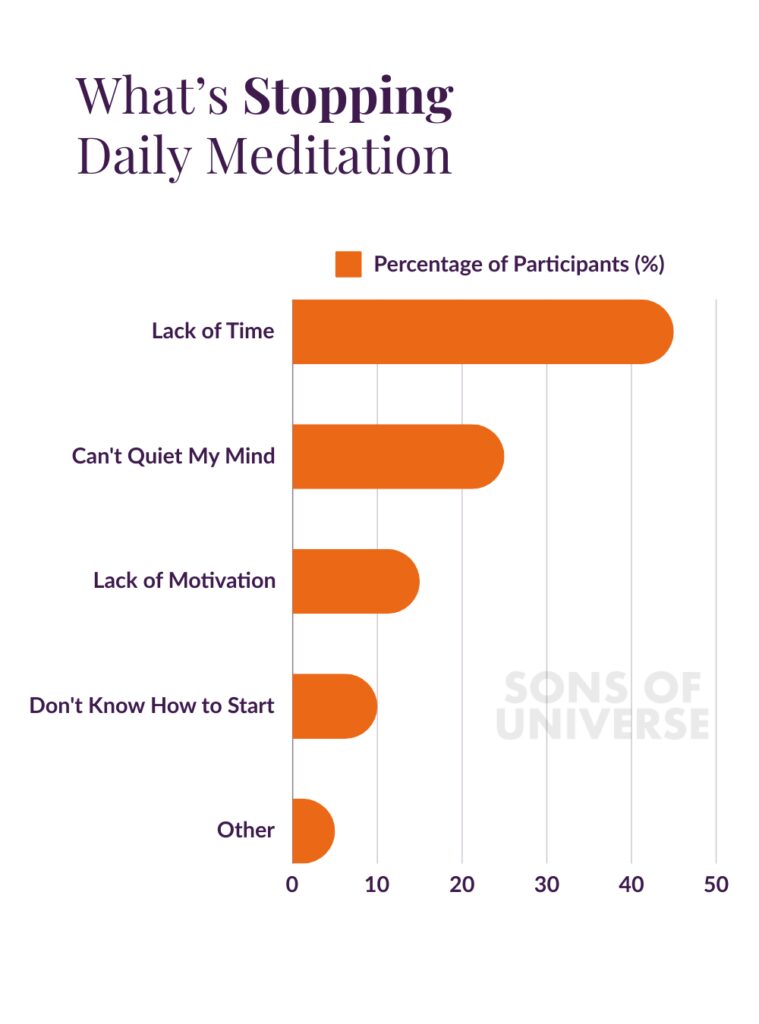
Life is busy, no doubt about it. Between work, family, and other commitments, carving out time can feel impossible. Yet, mindfulness practices don’t require hours on end. Even five to ten minutes a day can reduce psychological distress and improve cognitive processes.
Other common excuses include not being able to quiet the mind (24%) and lack of motivation (13%). Some people don’t know how to start or which meditation techniques to use. Luckily, there are plenty of resources available, from mindfulness-based interventions to meditation apps that guide you through the process.
Maybe it’s time to rethink our priorities. After all, taking care of our mental health is just as important as anything else on our to-do list. So why not give it a shot? You might find that investing a little time in mindfulness pays off in a big way.
13. Third Eye Openers: 68% Have Had Mind-Blowing Meditation Moments
When we asked if you’ve ever had a mind-blowing experience during meditation, 68% of you said yes. That’s more than two-thirds tapping into something extraordinary. Maybe it was a sudden feeling of deep peace, a burst of clarity, or a connection to something bigger than yourself.
These moments keep us coming back to the cushion. Mindfulness meditation isn’t just about stress reduction; it’s about exploring the depths of our minds. Studies have shown that meditative practices can lead to significant changes in brain activity, enhancing areas responsible for emotion regulation and self-awareness (source). So if you haven’t had that “aha” moment yet, keep practicing. It might be just around the corner.
14. Fifteen Minutes to Zen: The Ideal Meditation Length Revealed
How long should you meditate? According to our survey, 33% of you find that 11-15 minutes is the sweet spot. It’s enough time to settle your mind without feeling overwhelmed. Another 24% prefer 5-10 minutes, proving that even short sessions can make a difference.
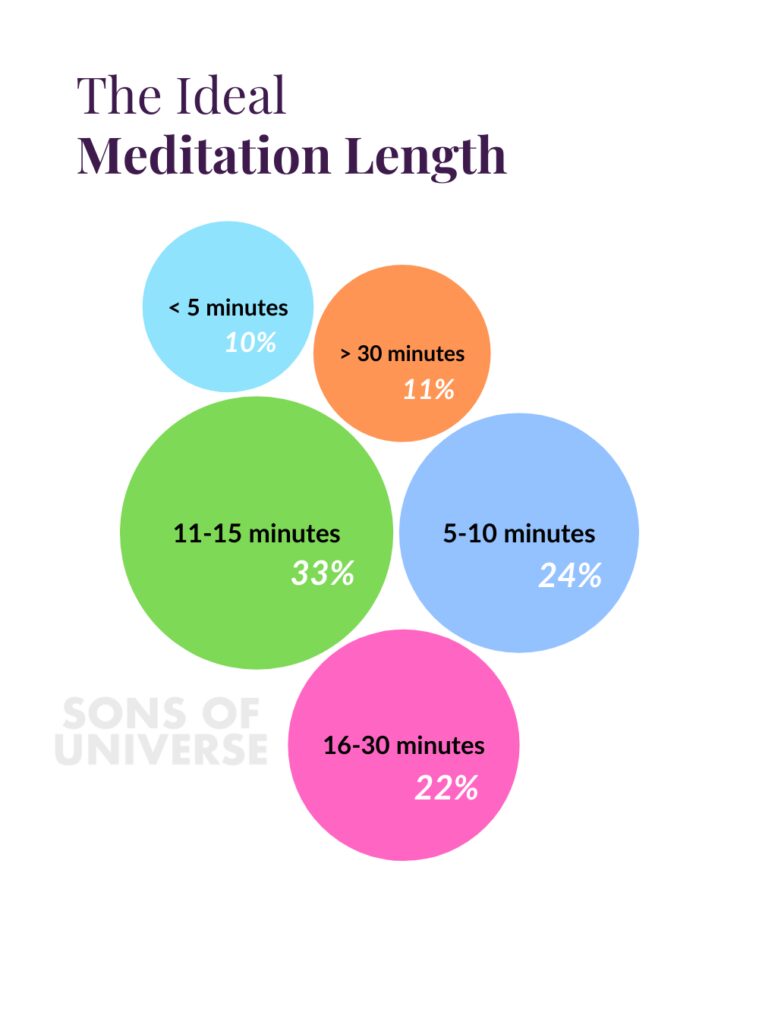
Whether you’re practicing mindful meditation or trying out different meditation techniques, consistency matters more than length. Even brief daily sessions can improve attention span and reduce psychological distress. So if you’re short on time, don’t worry. Just a few minutes of mindfulness practice each day can lead to positive effects on your mental health.
15. Unexpected Gains: The Surprising Benefits No One Told You About
We all know about the benefits of meditation like stress reduction, but our survey uncovered some unexpected perks. For 33% of you, increased creativity was the most surprising benefit. Suddenly, ideas flow more freely, and problem-solving becomes easier.
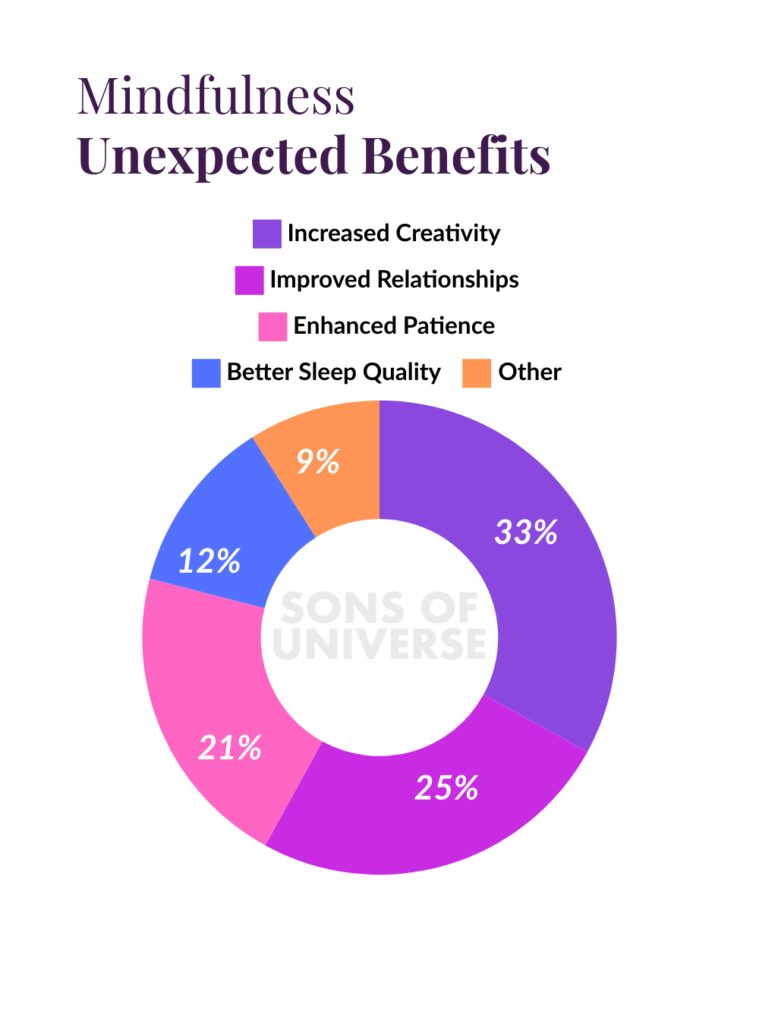
Another 25% noticed improved relationships. Mindfulness helps us be more present and empathetic with others. Enhanced patience came in for 21% of participants, making daily frustrations easier to handle. Even better sleep was a bonus for 12% of you. The benefits of mindfulness meditation go beyond what we might expect. Research shows that meditation can improve cognitive processes and even physical health (source). So if you’re on the fence about starting, these hidden benefits might just convince you.
16. Brain Hack or Hype? 82% Believe Meditation Rewires the Mind—Science Agrees!
A whopping 82% of our community believe that meditation can rewire the brain. And guess what? Science backs this up. Mindfulness meditation has been shown to change brain structure, increasing gray matter in areas responsible for learning, memory, and emotion regulation (source).
These changes can improve mental health and reduce symptoms of depression. Meditation affects brain activity, promoting positive effects and reducing negative emotions. It’s not just hype—the efficacy of mindfulness is supported by research. So when you practice meditation, you’re not just calming your mind in the moment. You’re making lasting changes that enhance your overall well-being. Isn’t that amazing?
17. Nap Time or Mind Time? Nearly Half Admit to Snoozing Mid-Meditation
Have you ever drifted off during meditation? You’re not alone. Our survey found that 47% of participants have fallen asleep while meditating. That’s nearly half! Sometimes, closing your eyes and focusing on your breath can be so relaxing that sleep sneaks up on you. But is this a bad thing?
According to experts, it’s not uncommon, especially for beginners. Meditation practices aim to reduce psychological distress and promote relaxation, so feeling drowsy can be a natural response. However, if you’re aiming for mindful meditation rather than a quick nap, try sitting up straight or meditating at a time when you’re more alert. Remember, the goal is awareness meditation, not slumber. So next time you nod off, don’t worry—just gently bring your focus back.
18. Escape Artists: Over 50% Use Meditation as a Quick Stress Fix
When stress hits, many of us reach for meditation as a lifeline. Our survey shows that 52% frequently meditate just to escape stress. It’s clear that the popularity of meditation is tied to its ability to provide immediate relief.
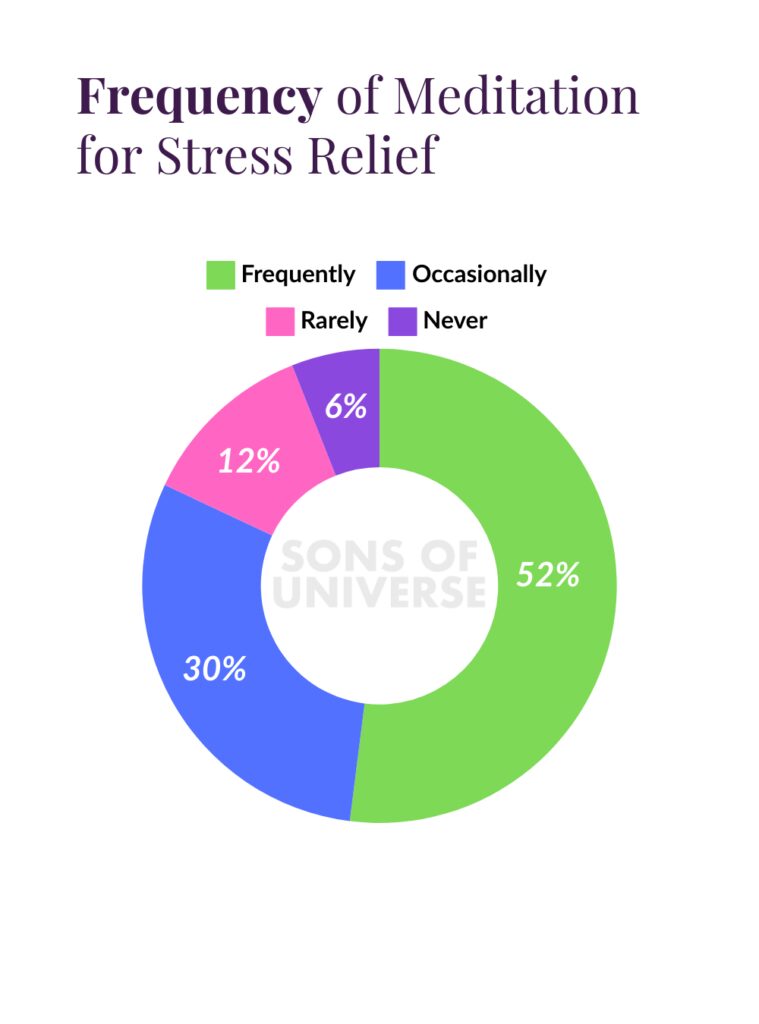
While using mindfulness-based stress reduction techniques can help in the moment, relying solely on meditation as a reactive tool might limit its long-term benefits. Regular mindfulness practice can improve emotion regulation and reduce chronic stress over time (source). So, while it’s great to use meditation to tackle acute stress, incorporating it into your daily routine could enhance its positive effects on your mental health. After all, prevention is often better than cure.
19. Solo vs. Guided: 62% Prefer Going It Alone—Here’s Why
Do you like meditating on your own or with guidance? According to our survey, 62% of participants prefer solo meditation over guided sessions. Why? For 40%, it’s about having a more personal experience. Meditating alone allows flexibility in practice, which 35% appreciate. Others find that going solo means fewer distractions.
While guided meditation programs and popular meditation apps offer structure, some feel they can better connect with their inner selves without external input. Whether you’re practicing Transcendental Meditation or other meditation techniques, the choice between solo and guided is personal. What’s important is finding a practice that suits you and supports your mental health journey.
20. Debunking the Empty Mind Myth: What People Get Wrong About Meditation
There’s a big misconception that to meditate, you must empty your mind completely. In our survey, 42% identified this as the biggest myth they’ve heard about meditation. The truth is, it’s natural for thoughts to arise during mindfulness meditation.
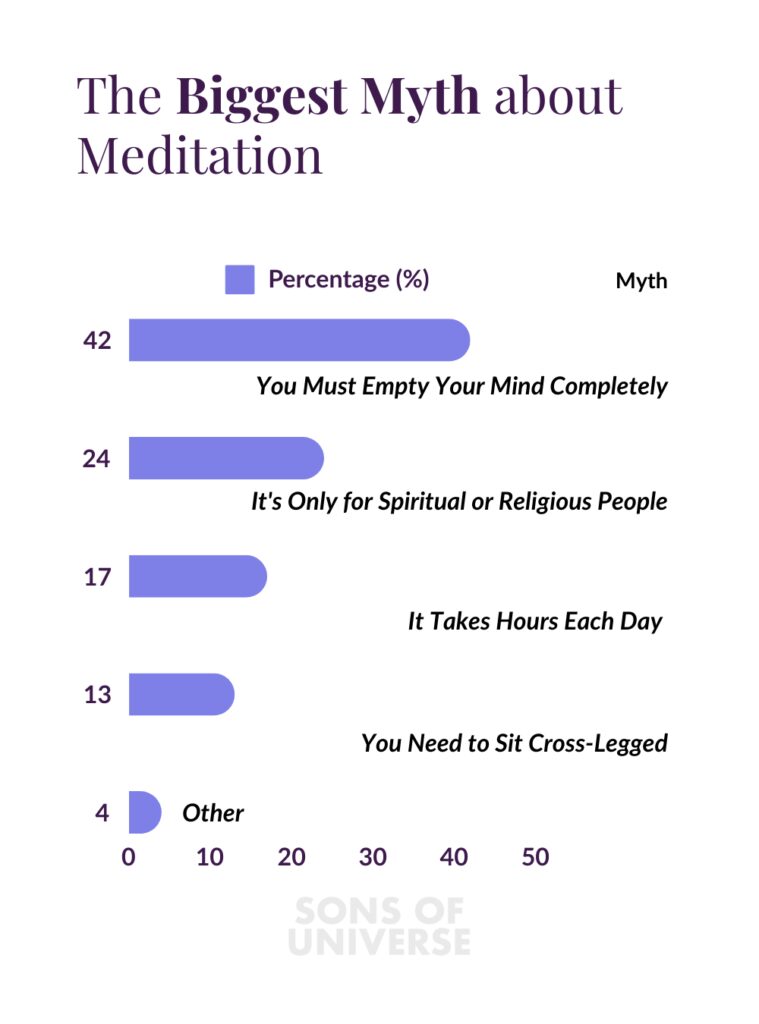
The practice involves acknowledging thoughts without judgment and gently bringing your focus back. Other myths include the idea that meditation is only for spiritual or religious people (24%) or that it requires hours each day (17%). In reality, even short sessions can have significant benefits. You don’t need to sit cross-legged or follow any strict rules. Meditation is accessible to everyone and can be adapted to fit your lifestyle. By letting go of these myths, more people might feel encouraged to start their own meditation practices.
21. App Fatigue: Only 28% Think Meditation Apps Actually Help
Meditation apps are everywhere, but are they hitting the mark? Our survey found that only 28% of participants find them helpful. That’s less than a third! Many people feel that these apps are too generic or distracting. They might prefer the simplicity of traditional meditation without the bells and whistles.
Some say that the constant notifications and subscription prompts take away from the mindfulness experience. Interestingly, a study published in the Journal of Behavioral Medicine found that while meditation apps can reduce stress, they may not be as effective as in-person mindfulness programs. Perhaps it’s time to unplug and return to basics. After all, the practice of meditation is about tuning into ourselves, not our devices. So if you’re feeling app fatigue, you’re not alone.
22. Epiphany Moments: 35% Experienced Life-Changing Insights During Meditation
Have you ever had a life-changing insight during meditation? According to our survey, 35% of you have experienced these profound “aha” moments. That’s over a third finding deep clarity on the cushion. These insights can range from personal revelations to a newfound understanding of the world around us.
Research suggests that mindfulness meditation enhances self-awareness and cognitive processes, paving the way for these transformative experiences. It’s incredible how sitting in silence can unlock such powerful thoughts. So if you’re still waiting for your epiphany, keep practicing. The benefits of mindfulness meditation often unfold over time. Who knows? Your next session might just bring the breakthrough you’ve been hoping for.
23. The Power of Affirmations: What Lifts Us Most During Meditation
Ever wondered what keeps us motivated during meditation? We asked our community about the most powerful affirmations they use, and the responses were inspiring. The top affirmation, used by 20% of participants, is “I am enough.” This simple yet profound statement helps many embrace self-acceptance and reduces negative emotions. Another popular choice, favored by 15%, is “Let go and let be.” This phrase encourages releasing control and trusting the process, which can enhance emotion regulation.
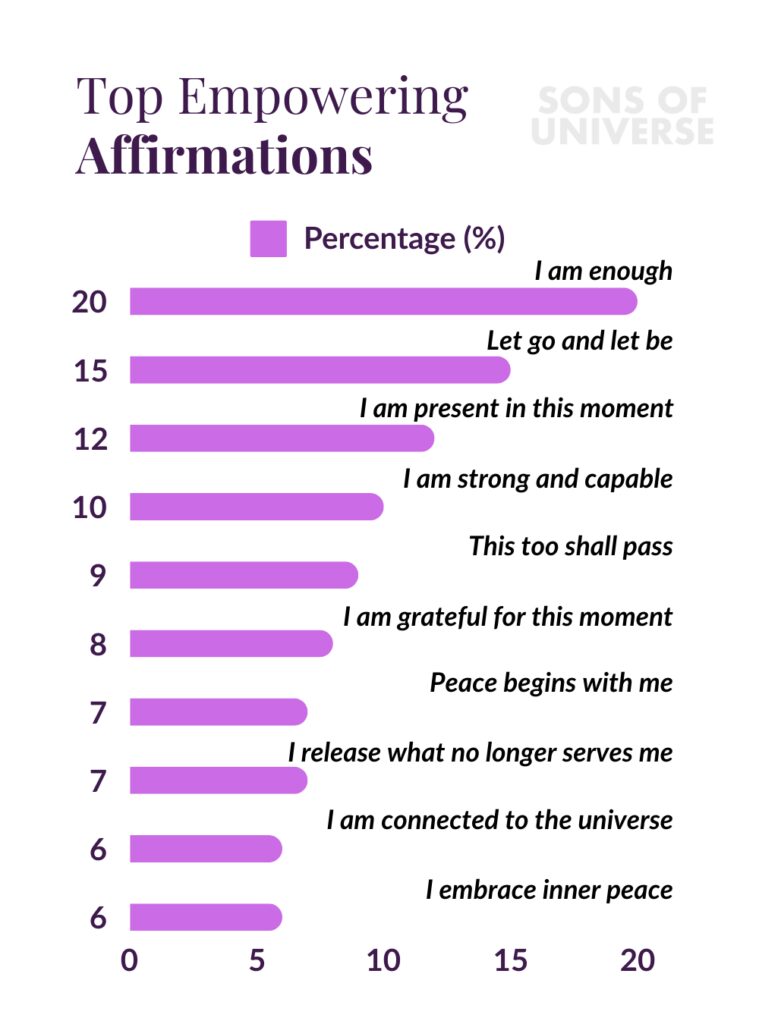
Interestingly, 12% of respondents use “I am present in this moment” to ground themselves during mindfulness meditation. This aligns with the core principles of mindful meditation, focusing on the here and now. The remaining group shared unique affirmations tailored to their personal journeys, highlighting that there’s no one-size-fits-all approach.
Affirmations can boost the positive effects of meditation by reinforcing desired beliefs and attitudes (source). So, if you haven’t tried incorporating them into your practice, it might be worth a shot. After all, a few powerful words can make a significant difference in your meditation experience.
24. Cosmic Calm: Which Zodiac Signs Meditate the Most in Our Community
We thought it would be fun to see if the stars influence our meditation habits. According to our survey, certain zodiac signs in our community are more inclined to meditate regularly. Pisces leads the pack, with 15% of dedicated practitioners born under this sign. Known for their intuitive and spiritual nature, it’s not surprising that Pisces folks gravitate toward mindfulness practices.
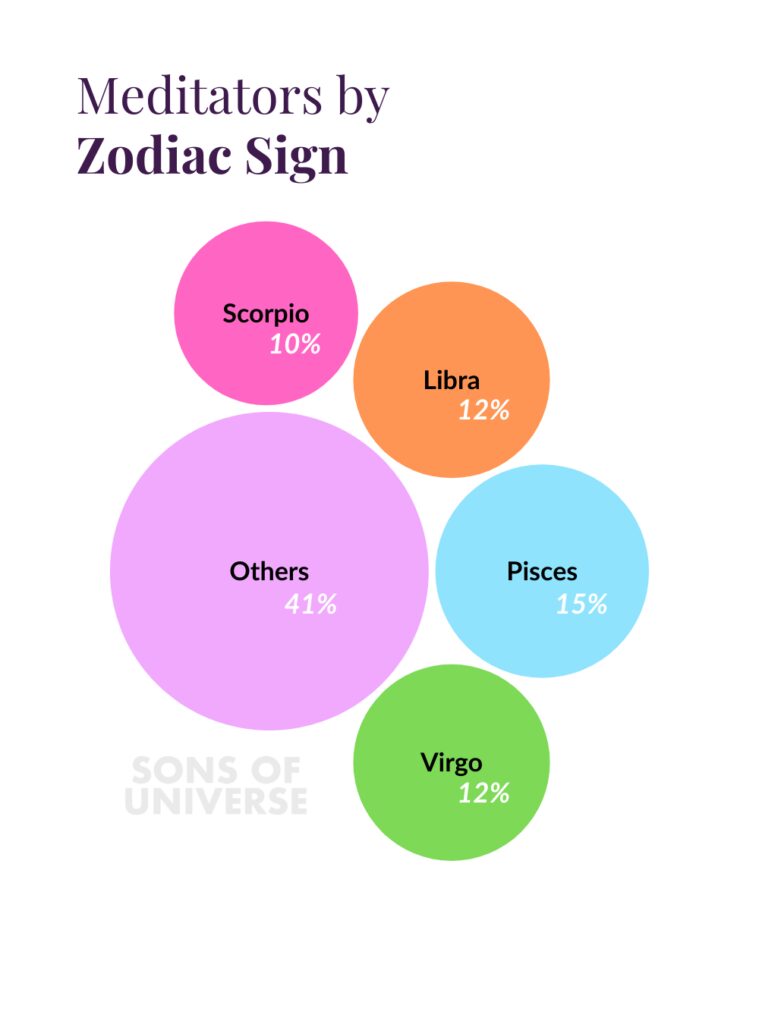
Close behind are Virgos and Libras, each making up 12% of regular meditators. Virgos’ desire for inner peace and Libras’ quest for balance might explain their commitment to meditation. Scorpios and Capricorns each account for 10%, possibly using meditation for emotion regulation and stress reduction.
While this is all in good fun, it’s interesting to see how personality traits associated with zodiac signs might align with meditation habits. Whether you’re a fiery Aries or a grounded Taurus, mindfulness meditation offers benefits for everyone. So, no matter what the stars say, finding time for mindfulness could enhance your mental health and well-being.
Is Mindfulness Overrated? Our Community Is Split Down the Middle
Our survey shows that opinions on mindfulness are almost evenly split: 55% believe it’s worth the hype, while 45% think it’s overrated. So why the divide?
Some feel that mindfulness has become just another trend, with meditation apps and programs everywhere. They might have tried mindfulness-based interventions without experiencing the benefits they expected, leading to skepticism. Others may misunderstand what mindfulness meditation involves, thinking it’s not effective.
On the other hand, many have found significant improvements in mental health through mindfulness practices. Techniques like mindfulness-based stress reduction have helped with emotion regulation and reducing symptoms of depression. Research supports these positive effects. A meta-analysis in the Clinical Psychology Review found that mindfulness meditation can reduce psychological distress and enhance well-being (source).
Everyone’s experience is different. Personal beliefs and expectations shape how we feel about mindfulness. It’s important to recognize that what works for one person might not work for another.
Commercialization Concerns: Is Meditation Losing Its Soul?
Our survey revealed that 60% feel meditation is becoming too commercialized. Many worry that the essence of mindfulness is getting lost amid branded programs and the booming meditation apps market. Is meditation losing its soul?
Some believe that the surge of popular apps has turned a personal journey into a commercial enterprise. They feel the focus has shifted from inner peace to profit, making mindfulness seem less authentic.
However, others argue that increased accessibility is positive. Apps and online programs allow more people to explore techniques like Transcendental Meditation. According to the National Center for Health Statistics, meditation use among U.S. adults more than tripled from 2012 to 2017. This suggests more people are benefiting from mindfulness meditation.
It’s crucial to find balance. While technology introduces more people to mindfulness, we need to keep the practice grounded in its true purpose—improving mental and physical health.
Our Take on the Findings
At Sons of Universe, we embrace the diversity of experiences within our community. We understand that mindfulness and meditation mean different things to different people. Some are curious beginners exploring mindfulness practices for the first time. Others are dedicated practitioners who have integrated meditation into their daily routines.
We acknowledge that opinions on mindfulness are divided, and that’s okay. There’s no one-size-fits-all approach to mindfulness meditation. What matters most is finding what works for you. Whether you’re using meditation to manage chronic pain, reduce work-related stress, or enhance your attention span, it’s a personal journey.
We firmly support the benefits of mindfulness and meditation. Scientific research backs its positive effects on mental health, emotion regulation, and even brain structure. Studies have shown that mindfulness meditation can increase gray matter in brain regions associated with learning and memory (source).
So, we encourage you to explore mindfulness authentically. Try different meditation techniques, whether guided sessions or solo practice. Be patient with yourself, and remember that it’s okay to have doubts. What’s important is that you’re taking steps toward improving your well-being.
Conclusion
Our survey uncovered some eye-opening mindfulness and meditation statistics. From the gender gap to divided opinions, it’s clear that mindfulness touches each of us differently.
We invite you to reflect on your own journey. How do these insights resonate with you? Maybe they inspire you to try a new meditation technique or revisit an old practice.
In the end, mindfulness has the potential to transform your life when approached authentically. Whether you’re just starting out or have been practicing for years, we hope you’ll continue to explore the benefits of mindfulness and make it your own.
The post Exclusive Survey of 57,410 Mindfulness & Meditation Enthusiasts Reveals Eye-Opening 2024 Trends appeared first on Sons Of Universe.

No comments:
Post a Comment